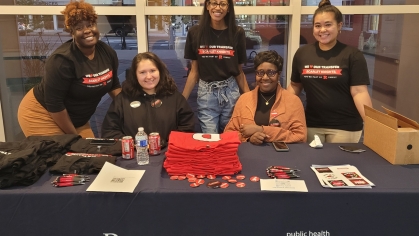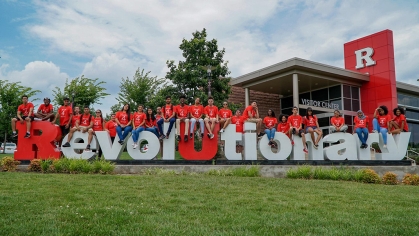Breaking the Stigma
Like many people, the idea of going to therapy made Hailey Kim uncomfortable. Even after making an appointment, she paced outside the doors of the counseling center, texting friends, hesitant to follow through. She was scared of being judged and nervous about talking to a complete stranger about her most personal thoughts and feelings.
After some encouragement from her friends, Hailey walked through the front door and met with a therapist at Counseling, Alcohol & Other Drug Assistance Programs, and Psychiatric Services (CAPS). She saw the positive effects in her life almost immediately.
“Honestly, after only three or four weeks of therapy, I was already seeing differences,” said Hailey. “When I completed my program, I felt completely free from trouble. It felt like a new chapter in my life was beginning and I wasn’t bound to anything. That if I could overcome my trauma I could do anything. It was liberating.”
Hailey first experienced trauma-related stress as a child growing up in South Korea. But it wasn’t until the end of her first year at Rutgers School of Pharmacy that her stress began to feel unmanageable. Between exams, the competitive environment, and her mother falling ill back home, Hailey started having trouble concentrating in class, was constantly worried about falling behind, had trouble enjoying social events, and sometimes had difficulty breathing. By summer she was experiencing full-on, panic attacks.
“It’s like you want to breathe deeply but you can’t. Like someone is squeezing your heart,” said Hailey.
Knowing that one of her friends found CAPS helpful, Hailey decided to make an appointment. The initial consultation was much easier than she expected and led to a few different treatment options: group therapy, various workshops, or individual therapy. Hailey chose individual counseling and began a type of therapy called Cognitive Processing Therapy (CPT).
It’s like you want to breathe deeply but you can’t. Like someone is squeezing your heart.
Broadly speaking, CPT involves re-evaluating the relationship between your thoughts and feelings and identifying how negative beliefs interfere with your recovery. Through a combination of conversations with your therapist and homework, you learn how to better process your emotions.
Hailey’s homework focused on listing out emotions she associated with particular thoughts or events. Together, she and Dr. Wacha-Montes would discuss her worksheets and whether Hailey was correctly identifying the right emotion.
“Sometimes I would write down sadness instead of anger because I still didn’t know which emotion to feel about certain things. Dr. Wacha-Montes would help me facilitate my thinking and be more specific about my emotions,” said Hailey.
Since completing 12 weeks of CPT, Hailey has had zero panic attacks and finds it much easier to concentrate in class and enjoy her social life. She has since become an advocate for breaking the stigma associated with mental health and in raising awareness among students of the services available through CAPS.
“I was really limiting myself in thinking about whether people would judge me for going to therapy,” said Hailey. “It’s something I wish I knew before going into therapy, but I just want fellow students to know that there is no shame in self-care.”
Hailey Kim is starting her third year in the Rutgers School of Pharmacy and is expected to graduate in 2021.
Financial support from alumni, parents, and friends helps us create the innovative learning opportunities that challenge students to be their best at Rutgers and beyond.
About the Division of Student Affairs at Rutgers–New Brunswick
The Division of Student Affairs is committed to facilitating interactions that promote students' success and their personal and professional development. Learn more about our mission.



